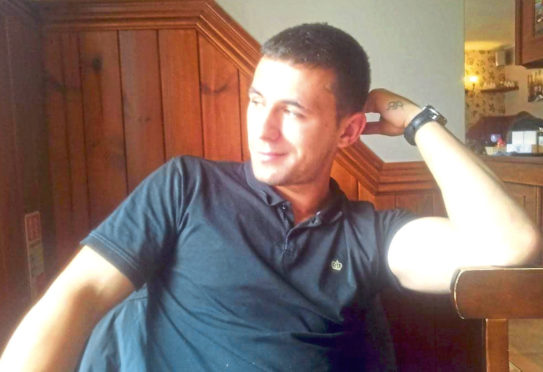The loved ones of an Aberdeen man stabbed to death by his best friend have called for families to be consulted over sentences.
The call comes as the Scottish Sentencing Council is carrying out a public consultation over new sentencing process guidelines.
Darren Barnes, known as Riley, was jailed for 10 years in March last year after a jury found him guilty by majority of the culpable homicide of his friend Robert Reid, 26.
Riley, whose address was given in court papers as Don Place, Woodside, had been accused of repeatedly striking Mr Reid to the head and body with a knife or similar instrument, and had denied murdering Mr Reid at his home on Arnage Place, Aberdeen, on October 26 2016, claiming self-defence.
During the trial at the High Court in Aberdeen the jury heard Mr Reid had 21 different injuries before they convicted him of culpable homicide.
A family member of Mr Reid’s, who did not want to be named, said: “I’ve moved on and I’m happy about where my life is.
“I’m not happy about the sentence he received.
“With Darren it came down to he’s never been in for a similar offence.
“The problem was the sentence never fitted the crime.
“Because Darren never had any previous they only gave him 10 years.
“Whether he had no previous or previous the length of the Clyde, I’d still be asking the same, that the punishment should fit the crime. Previous shouldn’t come in to it.”
The family member added: “At the end of the day families should be spoken to and asked ‘what would you like?’, especially for serious crimes.
“For serious crimes I think the family should be asked and the guidelines explained to them.
“It doesn’t mean they have to go with the family.
“At the same time it shouldn’t be left up to one judge.
“It should be a panel of judges.”
Keep up to date with the latest news with The Evening Express newsletter
The Scottish Sentencing Council is currently carrying out a public consultation over new sentencing process guidelines designed primarily to help people understand how sentencing decisions are reached.
Asked if they would have liked to have known the reasons behind the sentence the judge handed down, the family member said: “Of course I would have. By his hand he’s left a whole family devastated.
“I think it would have helped maybe a bit in the grieving process, understanding the reasoning.
“The reason I’m angry is it’s because he didn’t have any previous.
“I don’t see any other reason.
“If the judge did have other reasons I would have liked to know them for me to accept it.
“Even now I’m still highly bitter about it.
“Ten years is a long time but it’s not long enough for what he took.”
The sentencing council has also just released the findings of a national survey looking at the public view of sentencing.
Kate Wallace, CEO of Victim Support Scotland, said: “The results of the ‘Public Perceptions of Sentencing’ national survey demonstrates that there is a real gap between the perception and reality of sentencing in Scotland.
“More must be done to address the misconceptions around custodial sentences, and the lack of confidence in the effectiveness of community sentencing, if the general public and victims are to feel that justice has been served.
“The ongoing consultation by the sentencing council offers a real opportunity to increase public knowledge and understanding of how our courts work.”
The research was conducted as an opinion poll of 1,000 adults across Scotland between March and April of this year by Ipsos MORI.
Respondents were asked for their views on what the purposes of sentencing should be; how current sentencing is perceived; their awareness of different sentencing options and what sentences ought to be given for causing death by driving offences and some sexual offences.
It revealed the majority of respondents’ view is sentences were too lenient.
